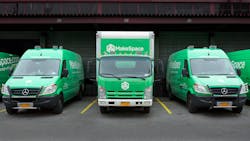Company: MakeSpace, New York
Operation: Privately owned and operated “white glove” self-storage company with 180 truck drivers and seven warehouses across the U.S. in major U.S. cities
PROBLEM:
MakeSpace is a company that bills itself as the “Dropbox of self-storage,” providing a full-service or “white-glove” transportation-warehousing combination at what Rahul Gandhi, the firm’s co-founder and COO, described as “a fraction of the cost” of traditional self-storage, where no transportation or handling of goods is included.
Gandhi explained that the reason MakeSpace can offer this “total self-storage” solution for about 50% of the cost of traditional self-storage options lies in precise data analysis through a proprietary tracking system developed by the company.
“We have over 500,000 items flowing through our systems,” he noted. Drivers pick up, package, and transport items to one of the MakeSpace warehouses, usually located in lower-cost industrial areas outside major urban centers, where they are tagged and stored on “racks—similar to what’s used in Amazon’s distribution centers.”
Gandhi said it took four years to develop MakeSpace’s proprietary system for tracking its trucks and the goods in its storage system. “It’s all based on efficiency; it’s how we’re able to do what we do,” he stressed.
Yet a gap existed in the MakeSpace tracking and tracing system: how to integrate payroll into the mix so the company could correctly “tag” its workers in order to see every dollar spent every hour and at every appointment.
Solution:
That’s where Atlanta-based software provider Deputy came in with its eponymous electronic check-in and check-out payroll system for drivers and warehouse personnel that they access via iPads set up as kiosks at MakeSpace’s facilities or via their smartphones. That data then helps provide transparency into estimated costs per hour of every day per every person.
“It became the ‘middleman’ in between our transportation and warehousing systems so we could look at efficiency for every task,” Gandhi explained.
Derek Jones, vice president of business development and customer success at Deputy, added that the company designed its payroll system to be user-friendly as well.
“Today’s worker expects business applications to be easy to use just like their social media, online banking, or communication apps,” he said. “If the gap between the apps they use at home versus ones they use at work is large, user adoption tanks.”
Jones noted that Deputy was developed for large businesses and got “skinned down” for smaller companies, which is atypical because most payroll systems are designed first for smaller companies and then have issues scaling reliability, security, and infrastructure when trying to adapt to larger ones.
He added that Deputy charges between $3 and $8 per employee per month, depending on the company’s needs, with messaging fees included.
About the Author
Sean Kilcarr
Editor in Chief
Sean Kilcarr is a former longtime FleetOwner senior editor who wrote for the publication from 2000 to 2018. He served as editor-in-chief from 2017 to 2018.
